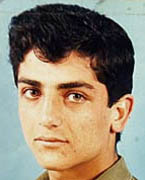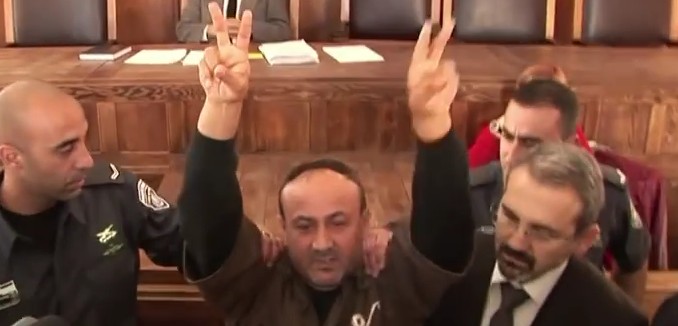Marwan Barghouti, the convicted Palestinian terror chief who recently published a controversial op-ed denouncing Israel in The New York Times, does not have a place “among free people” and should not be given a platform to whitewash his murderous crimes, the brother of one of Barghouti’s victims said Tuesday.
Jamal Barakat, brother of Sgt.-Maj. Salim Barakat, a Druze Israeli police officer who was killed in a Tel Aviv terrorist attack approved by Barghouti, called him “a man who plans, who assists, who sends terrorists to hurt those who are innocent.”
 “He is not worthy of being called a human, and maybe not even an animal because even animals don’t do those kinds of things,” Barakat said.
“He is not worthy of being called a human, and maybe not even an animal because even animals don’t do those kinds of things,” Barakat said.
“I think that all the grieving families are with me–whoever has committed the crime of killing innocents, and it doesn’t matter who, even a Jew, his place is not among the freed and not among free people, but behind a lock and bars,” Barakat emphasized. “Anybody who tries to soften it, tries to turn or spin it some way as some kind of goal or other, it is not acceptable at all.”
“A Palestinian state that every other day people are talking about–we are not against it, the opposite,” Barakat continued. “But that is not the way–by killing innocent people.”
“We are in pain and won’t forgive and won’t forget–even until today and forever–every person who took a part in sending that bastard terrorist who carried out that act. I grieve that this is how my brother fell.”
Salim Barakat, 33, was on routine patrol when Palestinian terrorist Ibrahim Hasouna opened fire at restaurant goers in Tel Aviv with a long-barreled M-16 assault rifle on March 5, 2002. Barakat arrived at the scene and managed to successfully shoot Hasouna, only to be fatally stabbed when checking the terrorist’s body for explosives. He was survived by his wife, 4-year-old daughter, parents, and seven siblings.
The attack was claimed by Fatah’s al-Aqsa Martyrs Brigade, which Barghouti helped establish in 2000. The brigade has been blacklisted as a terrorist organization by the United States, Canada, Japan, New Zealand, and the European Union.
According to the indictment filed against Barghouti in August 2002, he was notified of Hasouna’s plan before the attack took place, and granted his authorization. He was again notified shortly after it was carried out.
Barghouti was convicted of murder by an Israeli civilian court in May 2004 for his involvement in Hasouna’s attack and two others, which killed five people total. His other victims include Greek Orthodox monk Georgios Tsibouktzakis, 34; Yoela Hen, 45; Eli Dahan, 53; and Yosef Habi, 52.
As the head of Fatah’s armed wing Tanzim, Barghouti oversaw multiple terror attacks against Israeli civilians, including children, during the second Palestinian intifada. However, he was acquitted on charges of 33 other murders due to lack of evidence of direct involvement.
On Sunday, Barghouti published an op-ed in the Times denouncing Israel and announcing that he was launching a hunger strike with other Palestinian prisoners in Israel. No mention was initially made either in the op-ed or by the Times that Barghouti, who sought to incorrectly portray himself as a political prisoner, was in fact sentenced to multiple life terms over his role in the killing of five people. After a major backlash, the paper appended an editor’s note acknowledging that Barghouti was found guilty of “five counts of murder and membership in a terrorist organization.”
Barghouti was elected to Fatah’s Central Committee in December, winning more votes than any other candidate. Polls consistently show that he is one of the most popular Palestinian political figures.
In The Myth of the Palestinian Mandela, published in the April-May 2017 issue of The Tower Magazine, media analyst Dexter Van Zile criticized efforts to whitewash Barghouti’s terrorism convictions and portray him as a “Palestinian Nelson Mandela.”
Barghouti certainly did support attacks on civilians, and we know this because he explicitly said so in public. Moreover, he acted according to his beliefs. Prior to his arrest in 2002, he was the leader of Tanzim and the al-Aqsa Martyrs Brigade, terrorist organizations responsible for the deaths of dozens of Israeli civilians on both sides of the Green Line. In 2012, Haaretz stated succinctly, “There is no question he supported and encouraged violence.” It reported in July 2016 that, as the Second Intifada progressed, Barghouti declared, “The time when only we sacrifice victims is past. We must take revenge. We must kill Israelis. Yes. We have bullets. We have rifles, and they will be aimed at the occupation.” He also predicted that the Second Intifada “will be the last round of violence, because the Palestinians have a feeling that they restored their self-respect through the attacks.”
Such sentiments were completely foreign to Mandela. In a speech at the 1964 trial that put him in prison, Mandela admitted that he did support the use of sabotage, but only to obtain the rights that had been denied to black South Africans, which they had previously hoped to obtain through non-violent methods. By way of comparison, the Palestinians have used terrorism since the beginning of their national movement, and did so even after they were offered statehood at the 2000 Camp David negotiations.
[Photo: YouTube]




